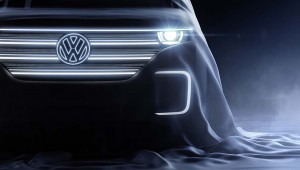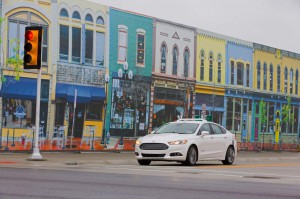You’ll be hearing plenty about the so-called “Internet of Things,” and there’ll be rooms full of next-generation TVs and digital cameras. But some of the biggest headlines to come out of the annual Consumer Electronics Show in Las Vegas this week will be made by automotive manufacturers.
Ford is expected to announce a major alliance with Google; General Motors will reveal the production version of its long-range electric vehicle, the Chevrolet Bolt and, among other announcements to come from CES, Volkswagen will unveil a new battery-electric minivan.
Many of those announcements might, in years past, have been made just a week later, at the North American International Auto Show in Detroit, but “The traditional approach, having all new cars debut at a traditional car show, has been eroding,” said Stephanie Brinley, senior analyst with IHS Automotive. “And CES is part of that erosion.”
To be sure, this isn’t the first year that automakers have participated in the Consumer Electronics Show. Former Ford CES Alan Mulally was a regular keynoter at the event during his tenure in Detroit. And a number of significant automotive announcements have come out of the annual Las Vegas event in recent years.
But 2016 sees the auto industry amp up its presence at CES, with nearly a dozen different manufacturers scheduled to make announcements in the coming days. And a number of key automotive suppliers also will be on hand.
“CES is a good place to show cutting-edge technology,” suggested Brinley, though she noted that there are some differences in the type of audience it attracts. Visitors to a classic car show are used to seeing concepts that could be years out from production while “the audience at CES has a very different expectation.” They’re used to seeing things that are either in production or will be in a matter of months.
But the blurring of lines reflects the dramatic transformation reshaping the auto industry. Today’s cars routinely rely on 50 or more microprocessors to operate everything from their engines to their active safety systems to their high-tech infotainment systems. And tomorrow’s cars will have even more digital technology onboard.
*By 2020, the first fully autonomous vehicles are expected to go into production, and several makers will have semi-autonomous models on the road by the end of this year;
*Connected car technology, allowing vehicle-to-vehicle and vehicle-to-infrastructure communications, may soon be required by law.
*A growing number of vehicles now come with 4G LTE links and onboard wireless hotspots. And many models will soon be able to automatically download software updates, much like computers and smartphones;
*And by 2025, when tough new fuel economy rules take effect, a large percentage of vehicles are expected to use some form of electrification, whether hybrid, plug-in or pure battery-electric drivelines.
(Ford and Google deal to go beyond autonomous vehicles. For more, Click Here.)
The automotive announcements planned for CES this week will touch on all of these topics – and more.
Ford is set to reveal a far-reaching deal with Google that would mean sharing the tech firm’s cutting-edge autonomous vehicle technology as well as other alternative mobility technologies.
Volkswagen will reveal an all-new battery-electric minivan, while General Motors will show the production version of the Chevy Bolt it revealed in concept form at the Detroit Auto Show last January.
Chinese-owned start-up Faraday Future will also stake out a presence, using CES to show off its planned electric vehicle for the first time.
(Click Here for details about plug-in electrics hitting the roads in higher numbers than ever.)
BMW introduced the world’s first in-car gesture control system on the 2016 7-Series, and it will show an even more advanced version in Las Vegas, while Toyota will reveal new high-definition mapping technology, critical for future autonomous vehicles.
German supplier ZF will discuss its work on the artificial intelligence systems also needed for autonomous driving. Other automotive suppliers will cover everything from in-car audio to next-generation display systems.
Driven by new connected car, safety and infotainment systems, digital displays are rapidly replacing traditional gauges, and an IHS Automotive forecast estimates they will generate $19 billion in annual business by 2021.
(To see more about Faraday’s debut of its vehicle at CES, Click Here.)
The role of electronics is only expected to increase in the years ahead, and that means that the auto industry will continue to stake out a major presence at CES for the foreseeable future.



